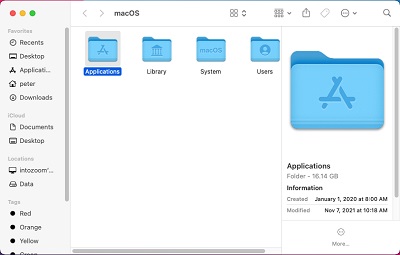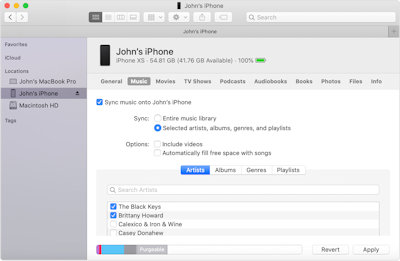Mac OS FAQ |
Updated: 1 January 2024

1. How do I get the size of a Folder?
Open a Finder window, select a folder and it will calcuate the size of the folders and display it in the right hand information window.
For example, in the above image, Applications is 16.14 GB in size.
2. How do I view properties of files?
You can right click the file, and select Get Info and an information box will appear, it will display the name of the name, its location, size, file association (if any), and permissions.
You can also enable the Preview pane so that file information is shown on the right hand side when the icon is selected (see image above).
3. How do I search or locate a file or application?
You can use Spotlight, click on the Magnifying glass at the top right and enter the name of the file, folder, or application and press Enter and it will search for it for you.
4. How do I change the Desktop background?
You can use System Preferences, Desktop and Screen Saver, select Desktop and select a picture or solid colour for your desktop. If you want to use your own pictures, either select Pictures below Folders or click on the plus (+) icon at the bottom to add your own picture folder.
5. How do I use the the Dock?
The Dock contains shortcuts to various applications or folders. To add new icons, open the Applications folder, and drag and drop the application icon on to the dock. To remove an icon from the Dock, select the icon and drag it to an empty area of the Desktop to remove it.
6. How do I display hidden items?
You can display hidden items by entering the following command in Terminal:
defaults write com.apple.finder AppleShowAllFiles YES
and restart finder by entering this command:
killall Finder.
Alternatively, you can download Tinker tool for Mac OS to change this and other hidden options, that are not in System Preferences.
7. How do I sync my media files with my iPod, iPhone or iPad?
In Mac OS Mojave or older, you can use iTunes to sync your music, films or TV programmes with your device using USB cable. Select the media files you want to sync, click on the device and click on Sync button to begin syncing. On Mac OS Catalina, you can now use the Finder to sync media to your devices, connect the device, open Finder, click on Locations on the left panel to select your device, select what media and/or which file(s) you want to sync and click on Apply. For more deails see HT201253 on Apple support.

8.What keyboard shortcuts can I use in Finder?
| Shortcut | Purpose |
| Cmd + 1 | View as icons |
| Cmd + 2 | View as list |
| Cmd + 3 | View as columns |
| Cmd + 4 | View as gallery |
| Cmd + , | Finder Preferences |
| Cmd + ` | Cycle through windows |
| Cmd + [ | Cycle to previous window |
| Cmd + ] | Cycle to next window |
| Cmd + A | Select all items |
| Cmd + C | Copy items to clipboard |
| Cmd + Ctrl + 0 | View as group |
| Cmd + Ctrl + 1 | Group by name |
| Cmd + Ctrl + 2 | Group by kind |
| Cmd + Ctrl + 3 | Group by date last opened |
| Cmd + Ctrl + 4 | Group by date added |
| Cmd + Ctrl + 5 | Group by date modified |
| Cmd + Ctrl + 6 | Group by size |
| Cmd + Ctrl + 7 | Group by tags |
| Cmd + Ctrl + A | Create shortcut or alias of item |
| Cmd + Ctrl + N | Create new folder with selected items |
| Cmd + D | Duplicate file or folder |
| Cmd + Delete | Move item to trash |
| Cmd + Down arrow | Open selected item |
| Cmd + E | Eject the external drive |
| Cmd + F | Open Search options |
| Cmd + I | Open Get Info dialog box |
| Cmd + K | Open Connect to Server dialog |
| Cmd + N | Open new Finder window |
| Cmd + Shift + 3 | Save screenshot of full screen |
| Cmd + Shift + 5 | Open screenshot app |
| Cmd + Shift + A | Open Applications folder |
| Cmd + Shift + D | Open Desktop folder |
| Cmd + Shift + H | Open Home folder |
| Cmd + Shift + O | Open Documents folder |
| Cmd + T | Open new tab |
| Cmd + W | Close current tab |
| Enter | Rename item |
More shortcuts are available here.
9. Finder Settings
Go to Securing your Mac